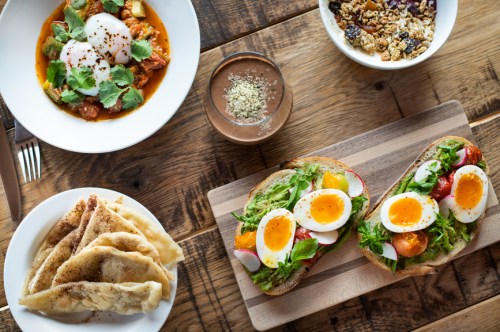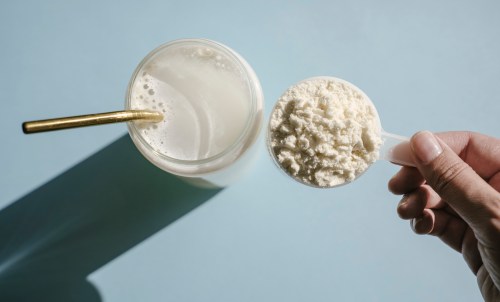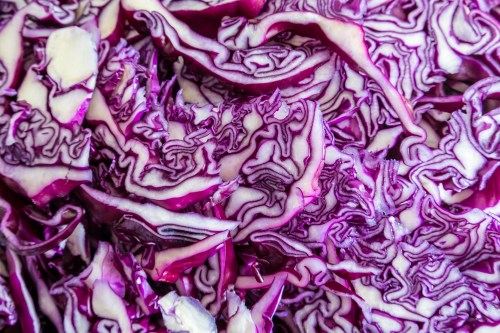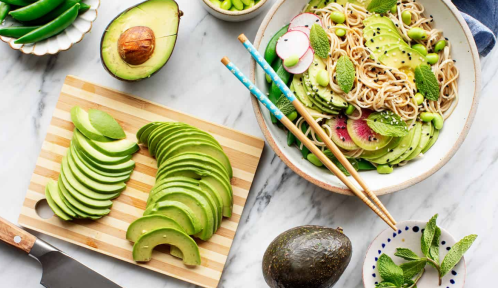Our editors independently select these products. Making a purchase through our links may earn Well+Good a commission
You’ve likely seen many a health and wellness influencer share what they eat in a day over social media (we meet again, toxic diet culture). Unfortunately for all of us, the majority of these video hosts are completely unqualified to administer nutrition advice, and this “what I eat in a day” trend can cause and exacerbate disordered eating patterns. This is why many dietitians have taken to TikTok and Instagram themselves to share that many of these meals aren’t exactly as well-rounded as we’ve been led to believe. (Shocker, we know… she says dripping in sarcasm.)
Experts in This Article
co-host and co-creator of the Happy Eating podcast
registered dietitian and CEO and co-founder of Culina Health
Case in point? The popular “myth” that eating two eggs offers enough protein for breakfast. We’ve asked Brierley Horton, MS, RD, co-host and co-creator of the Happy Eating podcast, and Vanessa Rissetto MS, RD, CDN, CEO and co-founder of Culina Health about why we need more protein for breakfast and how to up our intake without having to totally overhaul our favorite egg-filled morning meals.
Protein for breakfast: How much do you actually need?
Risetto says that protein intake recommendations should be based on an individual’s size, fitness level, age, and goals—but generally speaking, roughly 25 to 40 grams is a good place to start for breakfast. And although that may sound like a lot, Horton notes that there is a fair amount of research showing that eating around 30 grams of protein at each meal helps maintain muscle and a healthy weight.
“Eating two eggs each morning only offers you around 12 grams of protein,” says Horton. “To meet that 30-gram threshold, you’ll need to step up the egg intake or layer in other protein sources.”
Keep in mind: Upping your protein intake isn’t just about building more lean muscle mass. Getting enough is essential for longevity, boosting the health of your skin and nails, and keeping your immune system strong. Simply making a few tweaks at breakfast may help you feel more energized and focused all day long.
How to up your protein intake without overhauling your go-to breakfast
Of course, there’s absolutely nothing wrong with choosing eggs as your morning meal. After all, they are considered nutrient powerhouses by dietitians, offering a combination of protein, fat, vitamins, and minerals. Eggs are actually a key source of several nutrients that can be hard to obtain, especially for vegetarians, like choline, zinc, vitamin B12, to help you start the day off strong.
However, Rissetto says that it’s crucial to make the most of this morning meal by including adequate amounts of protein, fat, and carbs in addition to your eggs. “This formula is important for every meal, but it’s especially important at breakfast as your first meal of the day will set the tone for your blood sugar, energy levels, and more,” she says.
What is a good protein breakfast besides eggs?
So, what to add? “If eggs are your go-to, look for easy ways to up your protein count,” says Horton. “Sometimes that can be as simple as folding beans into your scrambled eggs or opting for a higher-protein bread or English muffin to make an egg sandwich.”
Horton also likes to serve up scrambled eggs with a high-protein side like cottage cheese, lean meat like turkey, or a hearty piece of toast with lots of nut butter for an easy, satisfying breaky. You’ll want to consider adding complex carbohydrates and fiber to round out your eggy breakfast. A yogurt parfait with fruit and granola can be a delicious side to an egg scramble, and the same goes for a protein-rich fruit smoothie. Food for thought!
What are 5 high-protein foods?
According to the USDA, foods high in protein include: seafood, meat, poultry, eggs, beans, peas, lentils, nuts, seeds, and soy products. Among these, researchers suggest that red meat should be consumed more sparingly while integrating of variety of other protein sources like poultry, seafood, and legumes.
Ranked in terms of highest protein content, you’ll find at the top of the list stands lean chicken breast with about 32 grams of protein per 100-gram serving. Following the chicken, there are lean pork chops with 31 grams of protein per the same size serving. Then, tuna with 29.9 grams, skirt steak beef with 28.7 grams, and firm tofu with 17.3 grams of protein. As a reminder, a 100-gram serving of eggs (about two eggs) only has about 12.3 grams of protein, which is far below the 30-gram mark.
Top 5 high-protein foods (per 100-gram serving)
- Lean chicken breast: 32 grams of protein
- Lean pork chops: 31 grams of protein
- Tuna: 29.9 grams of protein
- Skirt steak beef: 28.7 grams of protein
- Firm tofu: 17.3 grams of protein
How to eat 30 grams of protein for breakfast?
Although lean pork chops have about 31 grams of protein, it might not be your first pick when it comes to a simple breakfast meal. That said, finding ways to up your protein intake first thing in the morning is easy when pairing high-protein foods together. One of our favorite options is combining a high-protein cereal, like Magic Spoon, which contains about 15 grams of it per serving and comes in a ton of tasty, fun flavors like peanut butter and birthday cake, with a three-quarter cup of Chobani Whole Milk Plain Greek Yogurt, which has about 16 grams of protein to help you meet your 30 (+1) grams of protein for brekky.
Of course, there are plenty of other protein-packed breakfast options out there, too, like these 35 breakfast ideas that aren’t plain ‘ol smoothies. On the list are options like a braised kale frittata, broccoli, mushroom, sun-dried tomato scramble, or a healthy breakfast burrito. And if you’re looking for something that doesn’t require much brain power to make before you’ve had your first dose of caffeine for the day, you can always try these no-fuss, easy healthy breakfast recipes like creamy hands-off scrambled eggs or a spicy honey breakfast bowl that are as easy as one, two, and three.
If you’re looking to give your nogging a much-needed boost, you can also make a brain-friendly breakfast recipe packed with the top three brain-boosting nutrients to help keep you focused all day long. The “big three” are a well-balanced combination of protein, fat, and fiber. Together, these nutrients are jam-packed with benefits, from healthy aging and radiant skin to improving sleep quality and, of course, optimal brain health. Sign me up!
And although it may sound complicated, a breakfast made with the “big three” is much easier to make than you may anticipate. Think a breakfast comprised of pastured eggs with sauteed spinach and tangy sauerkraut. Meanwhile, if you’re looking for something vegan-friendly, you can combine scrambled tempeh with pumpkin seeds, olive oil, and sliced avocado.
That said, getting adequate amounts of protein throughout the day is also equally important (not only during breakfast time). Find out the full scoop on how much protein you need per meal and a few of the best recommendations to help you meet your daily quota during breakfast, lunch, and dinner.
Speaking of which, these protein-packed frittata muffins are basically the ideal eggy breakfast to pair with another protein-packed breakfast superstar:
Sign Up for Our Daily Newsletter
Get all the latest in wellness, trends, food, fitness, beauty, and more delivered right to your inbox.
Got it, you've been added to our email list.











